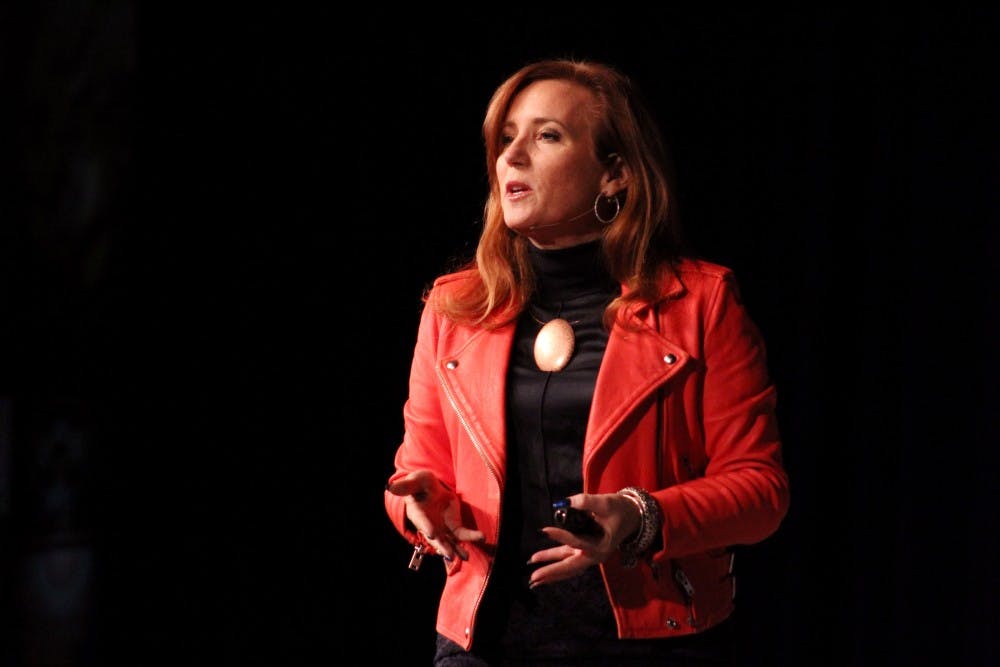Theresa Payton believes America’s approach toward cybersecurity is “fundamentally broken.”
Payton is one of the nation’s leading experts in IT strategy and cybersecurity and was the first female chief information officer for President George W. Bush. Payton spoke about the greatest security risks facing the nation, including North Korean and Russian hackers, an alarming string of data breaches and the dangers of talking Barbie dolls in the second Distinguished Speakers lecture Wednesday night in Alumni Arena.
Payton spoke to a small crowd outside Baird Point at 4:30 p.m. on Wednesday. She then met with Spectrum reporters for a brief question and answer session before her lecture.
Payton worked in the financial service industry, prior to joining the White House, so she was used to working in a male-dominated environment. In these roles, she recognized the important role she had as the first woman in her position to “pave a way in” for other women and make sure “other women get the opportunity to do really cool and interesting jobs.”
When Payton worked for President Bush, she was tasked with overseeing the cyber-security of thousands of government workers. She shared some of the tips acquired over her many years in the cyber-security field.
Payton spoke conversationally with the audience, not in a stuffy manner some students expected from someone who worked cyber-security in the White House.
Sadie Kratt, environmental geosciences major, appreciated Payton’s down-to-earth personality. Kratt said she expected the discussion to be “dryer” than it was.
“I don’t know a lot about cybersecurity and I felt like it was very informative and interesting,” Kratt said. “Also she was just very cool. She was very informative but also relatable.”
To give the audience a sense of how to approach cyber security in a more “human-proof” manner, Payton gave some homework assignments to the crowd to encourage them to think about the ways in which technology can be hacked.
Payton told audience members to use as many separate emails as they can think of; separating the spheres of their lives into different addresses. She also told them to never connect to a free, public wifi provider and to always cover the webcam on their computer.
After speaking for 45 minutes, Payton participated in a roughly 45-minute long Q&A, moderated by Thomas Ulbrich, assistant dean of the School of Management.
In her question and answer segment, Payton did not shy away from answering pointed questions about foreign policy and security around the globe.
Payton took a significant part of her segment to address the question she knew was on everyone’s minds: Russia’s interference with the election.
Although Payton argued that “political propaganda” and “foreign espionage” have taken place throughout all of history; she said this past presidential election revealed espionage on a larger scale than ever before.
Her response: read the news, not social media, to learn about what’s happening around the world. Payton revealed her own favorite method. She prefers to read foreign news first; starting with the BBC, The Guardian, The Russian Times (translated into English); then she reads The New York Times or The Wall Street Journal.
Payton received her first outbreak of applause when she reminded audience members of the importance the news media plays in spreading the truth in a world where fake news and cyber hacking happens on a larger, newer scale every day.
She also spoke about the ways cybersecurity needs to re-brand itself to attract women and other underrepresented minorities.
A.J. Thomas, a sophomore in interdisciplinary social sciences, said he found Payton’s speech to be unique from the other distinguished speaker series he’d attended.
“Her talk was really informative. At first, it almost sounded almost like a sales pitch but toward the [question and answer] portion, she really opened up and took a lot of opinionated stances which I feel like you don’t usually see,” Thomas said.
The lecture was sponsored by the School of Management, its Alumni Association, Center for Entrepreneurial Leadership and UB’s MBA program.
The next speaker in the Distinguished Speaker Series will be actor and civil rights activist Jesse Williams, on Nov. 18.
Sarah Crowley is the senior news editor and can be reached at sarah.crowley@ubspectrum.com





